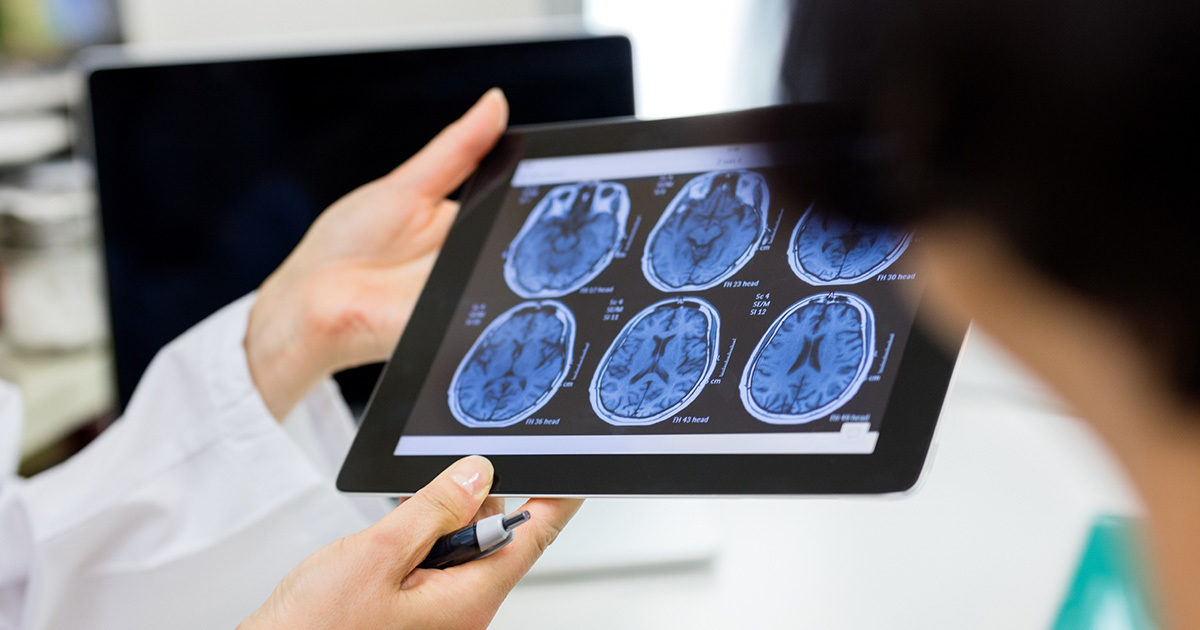Family Travels From Houston to Austin to Seek Expert Care Through UT Health Austin Pediatric Neurosciences at Dell Children’s
After experiencing years of debilitating migraines, teen finds relief and returns to school full-time
Reviewed by: Sara Pavitt, MD
Written by: Ashley Lawrence

Maya Olson, a 17-year-old high school senior from Houston, began experiencing migraines in the eighth grade. Her symptoms ranged from tremendous pain to blurred vision, nausea, and vomiting. When visiting with local doctors, she was prescribed birth control to regulate her hormones as well as B vitamins, magnesium, and two different migraine medications; however, her pain persisted. She also attempted injections in the back of head and in her nose and had her optic nerve and spinal fluid assessed to rule out any potential causes, of which none were found.
As Maya’s migraines continued, often daily and sometimes lasting for days on end, she began to frequent the emergency room in search of some form of relief, but the migraines would always return. There were many days when she was unable to get out of bed, and as a result, she missed a lot of school. “She went through hell,” says Maya’s father, Michael Olson. “This poor girl. She didn’t have very good quality of life for several months.” Maya eventually stopped attending school full-time, committing to only half-days while she and her family continued to seek answers.
Frustrated with Maya’s local doctors, Maya’s parents, Michael and Linda Olson, began researching other care options. Despite having access to centers that specialize in pediatric headache in Houston and Dallas, Maya’s parents choose to travel from Houston to Austin so Maya could receive care from the Dell Children’s Pediatric Headache Center within UT Health Austin Pediatric Neurosciences at Dell Children’s, a clinical partnership between UT Health Austin and Dell Children’s Medical Center.
UT Health Austin Pediatric Neurosciences at Dell Children’s diagnoses, treats, and manages the care of children and adolescents with medical conditions of the central nervous system. Patients are cared for by a dedicated multidisciplinary care team, meaning patients will benefit from the expertise of multiple specialists across a variety of disciplines. Board-certified and fellowship-trained pediatric neurologists, neuro-ophthalmologists, neuropsychologists, neurosurgeons, and physical medicine and rehabilitation specialists that have extensive experience treating conditions of the central nervous work alongside a team of pediatric specialists, including hospitalists, anesthesiologists, nurses, advanced practice providers, health social workers, psychologists, child life specialists, dietitians, physical therapists, occupational therapists, speech therapists, neurodiagnostic technicians, pharmacists, and more, providing unparalleled care for patients and their families every step of the way.
As a leading neurosciences program in Central Texas, UT Health Austin Pediatric Neurosciences at Dell Children’s boasts a collaborative relationship with aligned disciplines that is unique in Central Texas. Embedded in the same comprehensive neuroscience program are pediatric neurology, pediatric neuro-ophthalmology, pediatric neuropsychology, pediatric neurosurgery, and pediatric physical medicine and rehabilitation. Subspecialty leaders collaborate and organize their services around the needs of the patients and their families to ensure that they receive the highest quality of care. This includes close collaboration with referring physicians and other partners in the community to schedule and coordinate any additional care services patients may need. Additionally, specialists can provide input and guidance for areas of the patient’s life that are affected by their medical condition by assisting with school services, school re-entry, socialization, and engagement in physical activities.
At the beginning of 2020, Maya transferred her care to the Dell Children’s Pediatric Headache Center. “Chronic pain and living with a migraine can be isolating for the family and the patient,” says UT Health Austin pediatric neurologist Sara Pavitt, MD, who serves as the Chief of the Dell Children’s Pediatric Headache Center. Maya’s care team at the Dell Children’s Pediatric Headache Center experimented with one medication that lessened Maya’s migraines; however, Maya was still experiencing debilitating symptoms, so Maya’s care team began looking into adult medications.
“We often use medications that are off-label or not FDA-approved in children because the studies haven’t been done in children,” explains Dr. Pavitt. “In any part of pediatrics, we have to borrow from adult literature.” When using adult medication, specialists across pediatric headache centers often share information about what’s working, what’s not working, and how best to use these medications. These specialists also take into consideration any possible side effects that may affect a patient with a developing brain or who is still physically developing.
Maya began taking adult medication to prevent her migraines from reoccurring. After three months of receiving a monthly injection, her migraines stopped. “It was a big help,” says Maya’s father. “She is just 180-degrees different.” Maya’s monthly injection continues to prevent her from experiencing migraines, and she has since returned to school full-time to finish out her senior year.
For more information or to make an appointment with the Dell Children’s Pediatric Headache Center within UT Health Austin Pediatric Neurosciences at Dell Children’s, call 1-512-628-1855 or visit here.